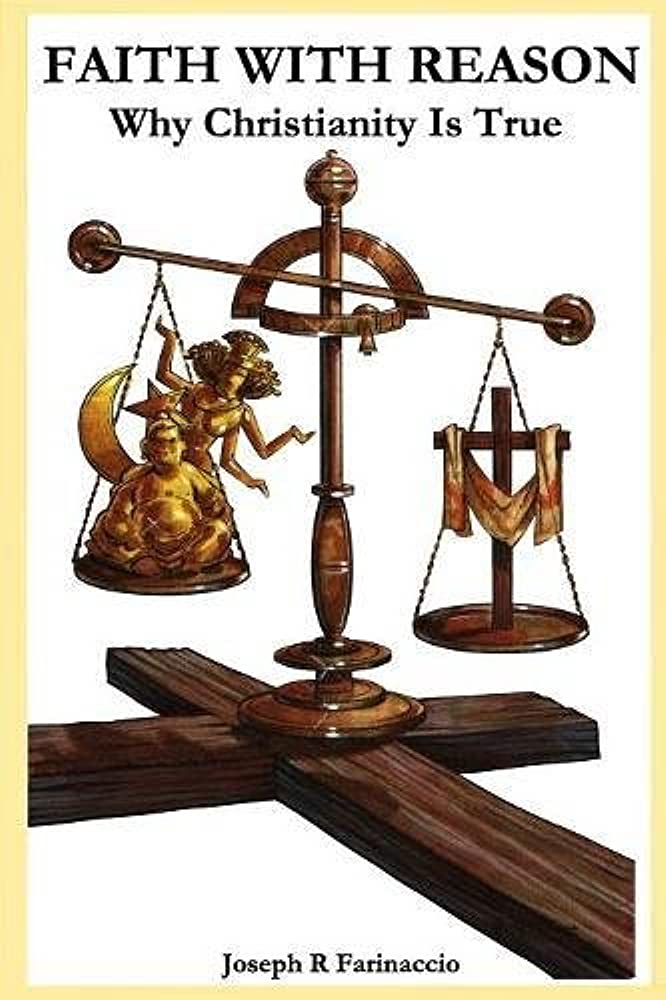
Have you read Faith With Reason : Why Christianity is True by Joseph R. Farinaccio? I had never run across it until a colleague asked if I had read it. That’s always the quickest way to get me to read a book! If I have someone else that has read it and would look forward to chatting about the book with them…I’m always in! This book was a quick read…under 100 pages, but a great resource for new believers, mature believers, or those who are leading others in the process of developing a biblical worldview.
I highlighted several things while reading and posted those notes below…
- Presuppositions are at the heart of worldviews. What exactly is a worldview? The English word for worldvien comes from “the German weltanschaaung. It literally means a life perspective or way of seeing. It is simply the way we look at the world. You have a worldview. I have a worldview. Everyone does. It is our perspective. It is our frame of reference. It is the means by which we interpret the situations and circumstances around us. It is what enables us to integrate all the different aspects of our faith, and life, and experience… A worldview is simply a way of viewing the world.” Our worldview is our life view wherein we try to integrate the sum and substance of life together in a way that makes sense to us. It represents our personal metaphysical outlook on life. p. 19
- Our most basic assumptions or presuppositions about reality collectively form the foundation of our worldview. Presuppositions are interconnected. They work together to form a web of basic beliefs. These presuppositions shape our worldview grid. This becomes the screen through which we interpret our whole universe. p. 19
- Many people seek to construct their own worldview themselves. They try to come up with answers about ultimate reality on their own when they do this. They are essentially saying, “I think that reality consists of such and such…etc.” But those who adhere to a biblical worldview do not rely upon their own arbitrary assumptions as a tool to construct their own explanations for what exists. They begin by assuming what the Bible reveals about reality is true. p. 20
- Christians regard the Bible as ultimate authority within their worldview because it is assumed to be the true Word of God. Those who wish to adhere to a biblical worldview consciously attempt to think about every area of life from a biblical perspective. Every biblical truth is taken as a Christian presupposition that will be held in faith as part of their whole biblical outlook on life. Bible-believing Christians assume that God has spoken with authority and also presuppose, in accordance with scripture, that what God has revealed in the Bible is true.
- The bottom line is that everyone reasons through a view of reality that is rooted in faith-based assumptions about the reality they perceive to be true. Everyone has a faith-based worldview which means there are no neutral areas of life. Every aspect of being and activity is interpreted through our worldview grid. p. 21
- If all reasoning is based upon certain basic assumptions about reality then faith and reason are always linked together. This is exactly the opposite of how most people see the relationship between them. They do not understand that faith actually precedes reason. Reason is not opposed to faith in itself. Faith is not something we “leap”S to after leaving reason behind. Faith is not a leap but rather a foundation. p.25
- Faith-beliefs are at the heart of every worldview. Theistic and non-theistic worldviews alike compete for both attention and supremacy in the mind of every human being. The ideas contained in them produce consequences for both individuals and cultures. Because of this a proper understanding of how faith and reason interact is one of the most important concepts anyone can ever comprehend. p. 28
- The Bible appeals to no authority other than itself and claims to be the very Word of God. Either it is or it is not. If it is then it must be taken on its own authority and accepted as God’s revelation to man. The Apostles claimed that all scripture is completely inspired of God, (2 Tim 3:16) authoritative, (Matt 5:17-19) and true in what it records. (1Thess 2:13) This includes its entire picture of reality, including propositions about God, man and the cosmos. p. 39
- In a Christian worldview the exercise of human reason in pursuit of knowledge first assumes that man’s logic is a reflection of the mind of God. As a creature created in God’s image, man was also endowed with the ability to reason logically. This ability, although finite, points back to man’s Creator. Logic did not originate within an abstract mind floating around somewhere in the universe. God is the source of all reasoning and in order for man to reason properly his finite logic must rely upon God’s infallible revelation as an ultimate reference point for truth. p. 50
- Christians often fail to understand that making concessions to any aspect of evolutionary theory automatically infers that the Bible is less than completely credible as an authoritative source for religious truth. Every major doctrine of orthodox biblical Christianity has its roots in Genesis. Christian theology and history merge in the pages of scripture. The Bible records God’s works in human history. These works are important facts contained within Christian theology. Altering any aspect of what the Bible records as history undermines every doctrine in Christian theology. If the book of Genesis is not the historical account it’s portrayed to be then the whole Christian belief system falls apart. p. 79

